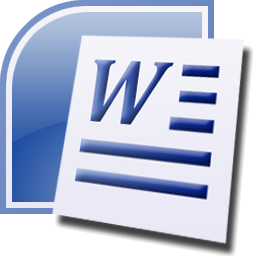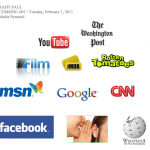Archive for the “Tech Blog” Category
Course: WORD 26 1-003 in George W. Johnson Center, Room 311B. 1-003 in George W. Johnson Center, Room 311B.
Described as follows: “Covers the intermediate level of Word 2007.”
Microsoft Word 2007 has, for a while, been something I’ve felt pretty competent with. However, I definitely learned a thing or two from this workshop!
In the first lesson, aptly named “Inserting Dates and Symbols,” we learned how to put dates and symbols into our paper.
Then, we went over Quick Parts and how that tool can make things quicker for writers that consistently use titles/pictures in their pieces. Additionally, the Building Blogs Organizer, which helps users sort building blocks by name, gallery, category or type, was pretty interesting.
The third lesson dealt with using AutoFormat in Word 2007. AutoFormat can format a document as the user types — it analyzes the user’s text as they type and then applies the appropriate formatting.
Lesson 4, “Working with Tables,” helped me apply the use of tables into my work, which is a useful way to throw a bunch of information into a clean, organized area of space.
Related to the use of tables, Lesson 5 was probably the most beneficial of all of the lessons. I learned about aligning table text, merging cells within a table and converting a table into text.
 No Comments »
No Comments »
 Course: RSCH 110-005, in Fenwick Library, Room A214. Course: RSCH 110-005, in Fenwick Library, Room A214.
Described as follows: “Zotero is a Firefox browser based utility that makes capturing bibliographic content from around the Web a snap! Learn how to install and manipulate your own Zotero library.”
Right now, Zotero only works through Firefox. It helps you “collect, organize, cite and share your research sources,” according to their official Web site. It recognizes sources immediately off of database Web sites — users can instantly select the sources and add them in their Zotero folder, straight from the database.
Exporting your library of sources is quite simple, too. Users even have the option to include their notes for each source along with their files. APA and MLA citations (among others) are accounted for when exporting, too, and they can even be assigned separately to different sources.
Personally, one of my favorite features right off the bat was the ability to create a timeline of your sources. It made it so simple to spot exactly when the source was written. Additionally, if you’re working off of multiple computers while researching, you can make an account on the Zotero Sync Server to bring back up all of your previously saved research. It truly saves a lot of time — just make sure you sign out!
Also, in Zotero, adding something manually has been given a new twist. From Instant Messages to films, from bills to maps, just about anything can be cited. When users have no idea how to cite something but really want to add it in their piece somehow, Zotero will figure it out.
 No Comments »
No Comments »

In his Washington Post article entitled “I Really Need You to Read This Article, Okay?“, Joel Achenbach writes about the popularity shift of newspapers as a means to get the news.
“Our future is on the Web,” he begins.
The term “newspaper journalism” used to resonate a sense “literary efforts [levitating] above the commercial fray,” but, according to Achenbach, no longer is this true. Nowadays, it’s all about page-views, about “eyeballs.”
“Marketing…may increasingly become part of the journalistic mix,” Achenbach writes.
But there is still respect for skill. Regardless of platform, “good writing remains good writing” and although “the Web tends to be a chattier place…it is still a place where readers appreciate a well-crafted sentence, a nuanced thought, a fully elucidated thesis and commentary undergirded by fact, honesty and a generosity of spirit.”
To quote the HBO series The Wire, it’s the same game as always — just more fierce.
At the end of the day, though, our readers aren’t unintelligent.
“The most-read stories online are often what we’d all agree are the best pieces of journalism…but page-views can also lead journalists away from what we do best,” Achenbach reminds us.
This article wasn’t necessarily eye-opening, but it was definitely an interesting and relatively amusing rant.
Achenbach maintains his own blog, Achenblog, quite regularly.
 No Comments »
No Comments »
 Posted by rpaul2 in Tech Blog, tags: /Film, CNN, Facebook, Google, iMDB, MSN, Rotten Tomatoes, Washington Post, Wikipedia, word of mouth, YouTube
Posted by rpaul2 in Tech Blog, tags: /Film, CNN, Facebook, Google, iMDB, MSN, Rotten Tomatoes, Washington Post, Wikipedia, word of mouth, YouTube
For my Media Pyramid, I put Facebook, word of mouth and Wikipedia for my most common methods to acquire news. Although they’re not the most effective ways to get news, they’re how I get the news in my everyday life, regardless. MSN, Google and CNN come in next — be it on the Internet on their respective websites or on the television for CNN. /Film, iMDB and Rotten Tomatoes help me get the news that I TRULY care about! And, lastly, the Washington Post and YouTube are rare supporters in my everlasting quest to get the news!
 No Comments »
No Comments »
|
 1-003 in George W. Johnson Center, Room 311B.
1-003 in George W. Johnson Center, Room 311B.



 Entries (RSS)
Entries (RSS)